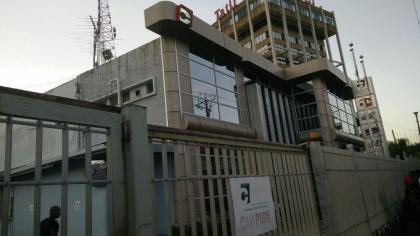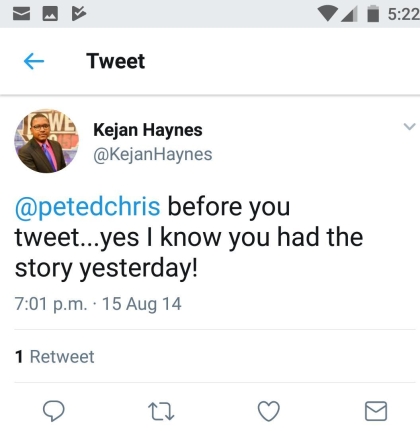Filed under: Uncategorized
It has been six years since my first day at the Caribbean Media Group.
And it is now seven days short of two months since Minister of Communications Maxie Cuffie announced the state owned media house would be winding up.
It was an announcement which had been expected, but one that had taken so long, there was a belief that perhaps it may not come. Not this year at least.

This blog has been long overdue.
I had hoped that it would come after further declarations, but at least the time has passed to allow the initial emotion to be quelled a bit.
Almost a year ago, I sat in my bedroom in a conundrum.
I was in a position where I should have been contented. I was in good enough financial stead to pick myself up and travel just about anywhere in the world.
I had a roof over my head, I had a job.
But I was unhappy about both arrangements.
I was aware that there were things I could not do, and things needed to change.
The changes came, albeit unplanned.
I write this from my apartment of which I have occupied for now six months.
Now it seems a change of job is also required.
But I digress..
My relationship with C didn’t start six years ago, but as a CCN Multimedia desk journalist.
Assigned to the Express South Office, yet in my first year in UWI, meant my commutes swung between Point Fortin and Petit Valley.
It meant watching news at 7, was near impossible.
But there was the C report at 9.
It wasn’t just convenient, it seemed fresh.
It was a sharp newscast, with both familiar and new faces that would later become household names.
I would then grow more impressed with their product as I caught First Up! on mornings.
A review of this blog would show just how often I referenced the show.
They continued to be a TV station doing things differently.
While Keisha David was out on the promenade for Morning Edition, Juhel Browne was out by the highway overpass intersection doing a stand up at 7am.
I would grow more impressed while covering the Water Taxi launch in 2008, as Desha Rambhajan would do a piece to camera at King’s Wharf during the event.
Lives and stand ups in the southern half of Trinidad remain rare to this day.
But being fresh, being different somehow could not work for C.
It seemed like it was never allowed to work to be honest.
Reports of significant debt were in the newspapers, but then came the real killer.
The curse of interference.
Suddenly Jabari Fraser was at Outta D Blue venting to me about stories which were changed.
Suddenly I found myself on Gayelle speaking on Fazeer Mohammed’s removal as First Up! host.
Then suddenly after a chance encounter with Raymond Edwards during an internship I found myself, after believing my career in mainstream local media was over, interviewing for a job at CNMG.
The question would come up, how would I deal with the rumoured happenings.
I said I could only focus on what I know to do, which is my job.
It’s a mantra I’ve held.
Yet despite the rumors, and the departures of a impressive collection of journalists like Jabari, Mark Bassant, Faine Richards, Kejan Haynes, Jovan Rovello, Charlene Ramdhanie and Golda Lee Bruce, I came into a solid newsroom.
I reunited with former CCN colleagues in Leeron Brumell, Juhel Browne with Darryl Heeralal starting the same day as me.
Darryl would point out to me that the newsroom was well staffed, and for that first month (especially when Karen Cozier-Phillip arrived) we, to quote Geoffrey Boycott commentating on Brian Lara in full flight, “had two shots for ever ball.”
But it would not last.
The exodus would continue.
The journalists would become disheartened by the mandates and decisions made above, and the departures kept going.
By September 2012, I was one of those who wanted out. It took a colleague’s words, her insistence that I did have a significant role to play in local media, that stopped me from walking away again.
Yet in the cruel twist, she would be forced out in a less than savoury manner not long after.
I saw the newsroom pick itself up again, and saw decision makers break it back down.
Over and over.
I came to realise that I was caught in the perfect storm.
It simply did not matter what I did or what we did.
We could not defeat the stigma.

This was not a rare occurrence..
It doesn’t matter that this was not the only time that TV6 or CNC3 got the story out later.
It didn’t matter how well Jonathan Chase covered the oil spill.
It didn’t matter how Lenn Almadin-Thornhill had our newscast up with the trends.
It didn’t matter what new angle I found, or thought piece I did which would go viral years after it was done.
It didn’t matter how well we covered elections before 2015.
It didn’t matter that what the people asked for in the consultation had actually been done by both GISL and CNMG to some extent.
It didn’t matter that the long list of journalists who left C, have become some of the major names of broadcast media at the main stations in the country.
The people did not believe, and the powers would return to what they knew.
The wave would come again, and what momentum we had would be lost.
Our brand could never survive this.
Especially in an industry that was already crumbling. WINTV went down, IETV downsized while OCM and GML have both sent home journalists.
The ship had been sinking for some time.
In May, Dr Terrence Farrell delivered a scathing speech at the Trinidad and Tobago Publishers & Broadcasters Association dinner, critical of media in general.
His views fell in line with opinions of many across the country.
All but those within his generation seemed capable of quality journalism, according to his words.
But as I sat at the media table I could not help but think of the saying: When you point a finger, there are three pointing back at you.
For all his vitriol, he seemed to exclude himself from the mess the media appeared to be in.
He scoffed of the lack of qualifications within the newsrooms yet he was on the board of CCN, when the choice was made to ask a young journalist to choose between finishing his thesis, or giving the Express his priority when a request for no pay leave to study was made.
He criticised the prejudices within the media yet throughout his speech he took jab after jab at the Guardian Media group, emphasizing his own bias.
I could only crack half a smile when Jones P Madeira would retort that all the time he took crying down the quality of local media, he spent much of his speech referring to incidents reported within that very media.
So as much as there were indeed segments of truth within his discourse, I could not help but think that his words were tainted.
But Dr Farrell is a highly regarded member of society. One regularly called upon to make decisions. And he is not the only one who has shown flawed thinking about situations.
Yet despite this, these decision makers continue to be given the reins to make critical choices about the country without ever really making a critical assessment of their track record.
These decision makers continued to be cycled along with their viewpoint, seemingly given a chance to say what isn’t working while they wait their turn.
So when he made his prognosis on state media, the August announcement could not be a surprise.
But the question remain, was this thought through?
I don’t know.